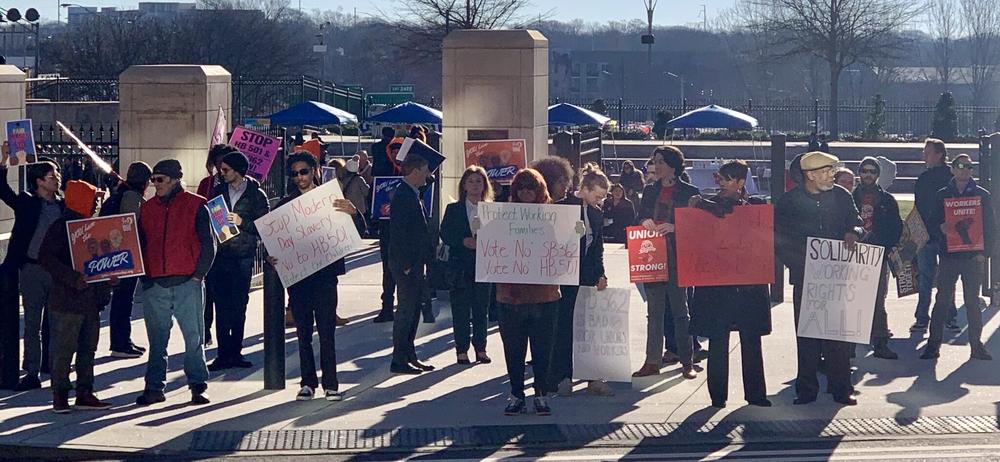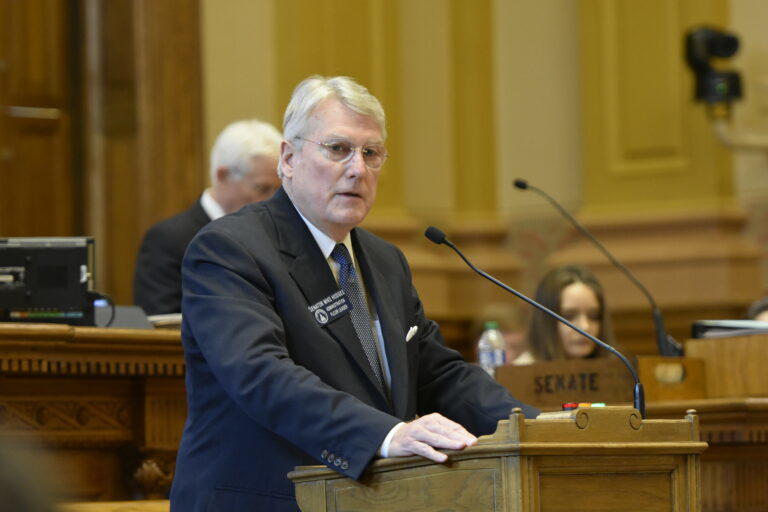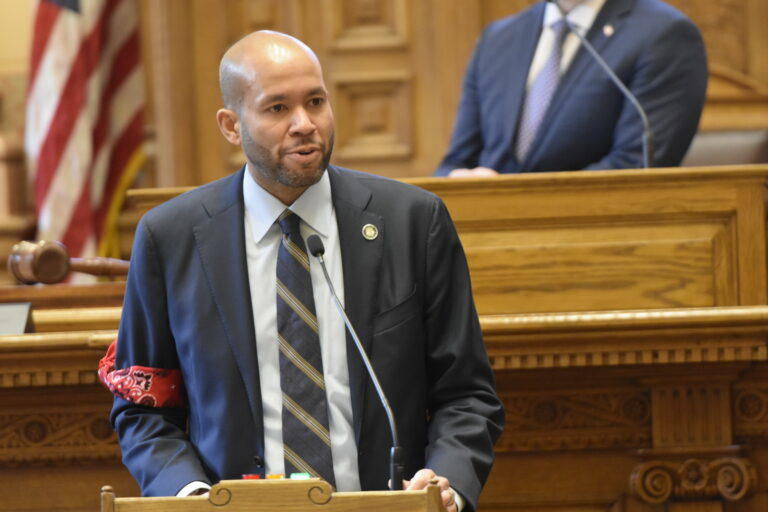
Caption
Pro-labor protesters gather outside the Georgia Capitol Jan. 30, 2024.
Credit: Stanley Dunlap / Georgia Recorder

Pro-labor protesters gather outside the Georgia Capitol Jan. 30, 2024.
Workers of the world, unite – but only if you hold a secret election first.
That’s what the state Senate said Thursday when it passed on party lines a labor union bill backed by Gov. Brian Kemp. Senate Bill 362 bars businesses that open shop in Georgia from receiving state incentives if they recognize labor unions, unless workers vote to unionize with a secret ballot.

Sen. Mike Hodges.
“The bill only targets voluntary actions of companies who agree to accept certain incentives, regardless of the outcome of a unionization effort,” said the bill’s sponsor, Brunswick Republican Sen. Mike Hodges. “It does not prohibit a company’s employees from unionizing or require an employer to oppose unionization efforts in any action. Employers are free to agree to hold union elections, however employers only lose eligibility for state incentives if they decide to skip secret ballot elections when it’s available.”
Hodges said the bill would not apply to a business that had a prior labor agreement that new locations would recognize a union.
The other path to unionization this bill attempts to avoid is called card check. It is less formal and involves collecting signatures from employees, usually on cards.
Acworth Republican Sen. Ed Setzler said secret ballots allow people to vote their conscience without intimidation or pressure, and that’s why they’re used for everything from church council elections to presidential elections. He said the Democratic caucus and labor unions use secret ballots to elect leadership.
“When you’re working shoulder to shoulder with people in an environment that matters, whether it’s running a labor union itself, whether it’s operating shoulder to shoulder in a dangerous workplace, having peace among those among us matters, and maintaining that peace – secret ballot to preserve right of conscience — is vitally important,” Setzler said.

Sen. Ed Setzler
Atlanta Democratic Sen. Donzella James, who said she has been a union member for air traffic controllers, U.S. Postal Service and Georgia Public Schools, said a union vote is a different scenario than the type of election most people are familiar with. When a majority of workers sign cards to join a union, employers can choose to voluntarily accept the union, or they can still call for a secret ballot election, she said.
“Voluntary recognition is beneficial for unions because it allows the union to begin negotiating immediately,” she said. “Secret ballot elections may take months to conduct, and employers often use intimidation tactics to prevent their employees from authorizing their unions. Currently, employers spend over $400 million per year on union avoidance consultants.”
Unless prospective unions can show they have overwhelming support and make voluntary recognition the clear choice, owners can use their financial advantage to put their thumb on the scale, said Sandy Springs Democratic Sen. Josh McLaurin.
“The employer still owns the means of production,” he said. “They are still the economic power in the room. What do they do? It’s called a captive audience meeting: all hands meeting, every employee is required to come and listen to all the employer’s talking points on why unions are such a bad idea.”
“So a secret ballot that takes weeks gives an employer an opportunity for a lot of things, things that amount to intimidation tactics, which is why voluntary recognition is a super important tool for unions that can get to that level of participation,” he added.

Sen. Jason Esteves speaks against SB 362. Some Democrats wore red bandanas in honor of a group of West Virginia coal miners known as the Red Neck Army who took up arms in the nation’s largest labor uprising.
Atlanta Democratic Sen. Jason Esteves said the bill oversteps the state’s power and violates national labor law and labor unions will sue.
“The lobbyists and the special interests that wrote the bill know that it’s likely not to hold up in court,” he said. “They also know that there are going to be lawsuits over this that are going to suck up taxpayer dollars, and Georgia taxpayers will ultimately be held paying the bill. But they think that they found a loophole, so they want this to be a test case. They want this to go to court because they’re hoping that the Supreme Court will allow them to chip away at the National Labor Rights Act.”
Republicans denied that idea. Sen. Bo Hatchett, a Cornelia Republican, said Arizona passed a ballot initiative declaring that the right to vote by secret ballot for employee representation is fundamental.
“And it passed. And it was challenged. And the federal judge said, ‘You know what? No, that can stay. That is not preempted by federal law,’” Hatchett said. “How is doing less than that going to be preempted? That’s a disingenuous argument.”
This story comes to GPB through a reporting partnership with Georgia Recorder.